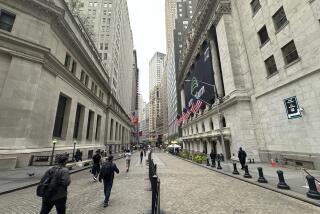ENERGY : Halt in Trading Fails to Dampen Oil Price Jump
- Share via
NEW YORK — Middle East tensions deepened Monday, pushing oil prices higher despite an early halt to trading in New York, home of the nation’s largest energy market.
Traders at the New York Mercantile Exchange, located in the World Trade Center in lower Manhattan, and other exchanges were forced to evacuate after a fire at a power substation knocked out lights and some computer trading systems.
But traders outside the exchange continued to deal in the cash market, where actual barrels of oil are exchanged for delivery in September.
“It’s just like the old days. Once again, cash markets are king,” said an oil trader in Houston, referring to the days before computerized trading was the norm.
In New York, the energy futures market closed shortly after 1 p.m. as the fire raged out of control. West Texas Intermediate, a key grade of crude, was last quoted up 54 cents at $26.77 a barrel.
After the forced shutdown, cash prices rose another 30 to 35 cents to about $27.10 a barrel. Cash trading takes place among those in the oil industry for actual barrels of crude. North Sea Brent crude was at $26.45 in late trading, up from $25.80 on Friday.
Prices rose as much as 70 cents a barrel Monday after Iraq issued a stern warning to its OPEC partners to avoid production increases that might offset oil shortages resulting from United Nations sanctions against it.
The Saudi ambassador to the United States responded by saying that the Organization of Petroleum Exporting Countries will meet soon to consider possible steps to minimize the impact of Middle East tensions on international oil markets.
Meanwhile, a nationwide survey found that gasoline prices at the pump Monday continued a downward trend.
The Automobile Assn. of America said a spot check Monday showed that the average price for self-serve unleaded gasoline was $1.216 a gallon. That was down 3.4 cents from last Thursday, when prices first showed signs of easing.
More to Read
Inside the business of entertainment
The Wide Shot brings you news, analysis and insights on everything from streaming wars to production — and what it all means for the future.
You may occasionally receive promotional content from the Los Angeles Times.










